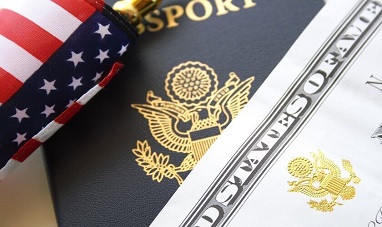What You Need To Know About Getting A Visa For Dual Citizens
Having dual citizenship can bring many benefits, but it can also create confusion when traveling and applying for visas. If you are a dual citizen, it’s essential to understand the process of applying for a visa and the requirements and considerations specific to your dual citizenship status.
In this guide, you will learn a step-by-step explanation of how to apply for a visa as a dual citizen to help you navigate the process quickly. For instance, you’ll discover how to apply for a Green Card to permanently reside and work in the U.S. and a B-2 visa to visit the country temporarily.
B-2 Visa Or ESTA Visa For Dual Citizens
If you are currently a citizen of two countries and are looking to visit the United States for leisure purposes as a tourist, you may be wondering if you can still apply for a B-2 Tourist Visa or an ESTA Visa. The simple answer is yes.
ESTA stands for Electronic System for Travel Authorization, which is a program run by the U.S. government to screen travelers before they arrive in the United States. ESTA is mandatory for travelers who are citizens of participating countries and are seeking to enter the United States under the Visa Waiver Program or VWP. It allows eligible citizens of certain countries to go to the United States for business or pleasure for stays of up to 90 days without obtaining a traditional visa.
When choosing between the B-2 Tourist Visa and the ESTA Visa, it’s essential to consider your travel plans, your citizenship status, and the specific requirements of each option. If you are eligible for the ESTA Visa, it may be your most straightforward and quickest option. However, if you do not qualify for the ESTA Visa or are planning to stay in the United States for longer than 90 days, you need to apply for a B-2 Tourist Visa.
B-2 Visa
To apply for a B-2 Tourist Visa or an ESTA Visa for dual citizens, it’s essential to understand the requirements and differences between the two options. The B-2 Tourist Visa is a traditional visa that allows you to travel to the United States for leisure, such as sightseeing, visiting friends or relatives, or participating in recreational activities. To obtain this visa, you must go through a formal interview process and provide evidence of your ties to your home country and your intent to return after your trip.
ESTA Visa
On the other hand, the ESTA Visa waiver program is a more straightforward option for citizens of select countries traveling to the United States for 90 days or less for business or leisure purposes. If you are eligible for the ESTA Visa, you can apply online, and the application process will be faster and less formal than a B-2 Tourist Visa. You will also need to pay a smaller application fee.
To be eligible for an ESTA visa, you must meet the following requirements.
- Citizenship: You must be a citizen of a participating country in the Visa Waiver Program (VWP). A current list of VWP countries can be found on the U.S. Department of Homeland Security’s website.
- Purpose of travel: You must be traveling to the United States for business or pleasure, and your stay must not exceed 90 days.
- Electronic passport: You must have a valid electronic passport that meets the requirements of the VWP. An electronic passport has a chip that stores your personal information, such as your name and date of birth.
- No previous visa denial: You cannot have been previously denied a visa to the United States or have been previously removed from the United States.
- No security or criminal concerns: You must not pose a security or terrorism threat to the United States. The ESTA application includes questions about your background, including your travel history and any prior criminal convictions.
- No intention to work or study in the United States: You must not intend to work or study in the United States, as the VWP is for travelers who are seeking to enter the United States for business or pleasure only.
F-1 Student Visa
As a dual citizen interested in studying in the United States, you may wonder if you can apply for an F-1 Student Visa. The good news is that you can apply for your F-1 Student Visa using either of your nationalities as long as you meet the eligibility criteria set by the U.S. government.
- Dual citizens can apply for an F-1 Student Visa in the United States using either nationality.
- Honesty and transparency about dual citizenship are crucial when applying for the F-1 Student Visa, as attempting to hide it may lead to consequences such as visa denial.
- When applying for an F-1 Student Visa, the following evidence must be provided:
- Ties to home country and intent to return after studies.
- Proof of financial support.
- Acceptance to a U.S. educational institution.
- Other supporting documents as required by the U.S. government.
- A U.S. consular official may conduct an interview, during which the dual citizen should be honest about their dual citizenship and provide any requested information or documentation.
- Proper preparation and attention to detail can increase the chances of successfully obtaining an F-1 Student Visa and pursuing educational goals in the United States.
Residency Visa In The U.S.
Obtaining a Green Card can be a good option for dual citizens who are interested in making the United States their permanent home. However, the eligibility to apply for a Green Card depends on various factors such as the applicant’s immigration history, employment status, family relationship with U.S. citizens or Green Card holders, and other criteria set by U.S. Citizenship and Immigration Services or USCIS.
Family Sponsorship
Family sponsorship is one way to obtain a green card or permanent residency in the United States. If you have an immediate relative who is a U.S. citizen or green card holder, they may be able to sponsor your green card application.
The process involves the U.S. citizen or green card holder filing an I-130 petition, also known as a family sponsorship petition, on your behalf, which must be approved by U.S. Citizenship and Immigration Services. Once the I-130 is approved, the next steps in the process will depend on your specific circumstances and immigration history.
Employment Sponsorship
Employment sponsorship is another way to obtain a green card in the United States. If you have a job offer from a U.S. employer, they may sponsor your green card application. The process involves the U.S. employer filing a Permanent Labor Certification with the Department of Labor or DOL and an I-140 petition, also known as an Immigrant Petition for Alien Worker with U.S. Citizenship and Immigration Services on your behalf.
Upon approval of the Labor Condition Application (LCA) and Form I-140, the subsequent steps in the procedure shall be contingent upon the individual’s unique situation and immigration history.
Regardless of your path, it is essential to provide significant documentation and personal information throughout the application process. You will be required to submit proof of your eligibility, such as evidence of your dual citizenship, family relationships or employment, and other supporting documents as required by the U.S. government.
Can You Become A U.S Citizen If You Already Have Dual Citizenship?
After spending five years in the United States as a legal Green Card holder, you can apply for U.S. citizenship. However, it pays to think carefully before applying for it if you already have dual citizenship. The United States allows you to hold three citizenships, but only if you agree to pay tax on all of your income.
This includes any income which you make offshore. If the governments of your other nationalities have similar laws, you may be double or triple taxed on all of your income. This could significantly decrease the disposable income you’ll be able to spend on your necessities and luxuries.
In this circumstance, unless you want to vote in political elections or apply for a job with a government department, you can reside in the United States indefinitely as a U.S. resident. You can even petition for a spouse, fiance, sibling, parent, or child to join you in the United States as a Green Card holder.
Countries That Allow Multi-Citizenship
If you hold dual citizenship, it’s essential to understand the laws and regulations of each country you are a citizen of. Many countries allow dual or multiple citizenships. Some examples include the following.
- Australia.
- Canada.
- Mexico.
- New Zealand.
- Spain.
- United Kingdom.
- United States of America.
It’s important to note that each country has laws and regulations regarding visas for dual citizens, and some may impose specific requirements or restrictions. However, it is essential to remember that some countries may restrict the number of citizenships you can hold and may not allow for triple or multiple citizenships.
Apply For A Visa If You Have Dual Citizenship
As a dual citizen, you can still apply for a Green Card in the U.S. as long as you pass other eligibility requirements. After holding a Green Card for five years, you can apply for U.S. citizenship if desired. If you plan to enter the U.S. temporarily, you can apply for a Visa with either of your nationalities without any legal hindrances. It is advisable to seek the advice of an experienced immigration attorney for further guidance on obtaining a U.S. Visa for dual citizens.
Why Hire An Immigration Attorney From Lincoln-Goldfinch Law – Abogados de Inmigración?
Lincoln-Goldfinch Law – Abogados de Inmigración is a Texas law firm experienced in immigration law. If you have dual citizenship and are looking to apply for a visa, hiring a skilled immigration law firm like Lincoln-Goldfinch Law – Abogados de Inmigración can help you navigate the visa application process.
They can assist with preparing and submitting your application. They can also help you understand the requirements and eligibility criteria for the visa. And lastly, provide advice and guidance throughout the process to increase your chances of a successful outcome.
Contact A U.S. Immigration Attorney Today!
Categories
How To Find Us
What Our Clients Say
“This Lawfirm is great, very professional and helpful. I love that they are always in communication and always available for when you have questions . 100% recommended by me and my family. Thank you Lincoln-Goldfinch Law – Abogados de Inmigración”







